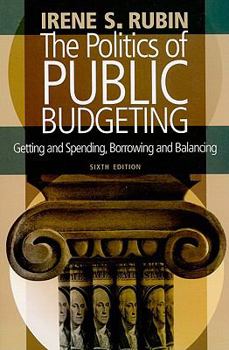Politics of Public Budgeting: Getting and Spending, Borrowing and Balancing
Select Format
Select Condition 
Book Overview
Using a "power struggles" theme to examine the dynamics of budgeting, The Politics of Public Budgeting shines a bright light on the political jockeying between interest groups, parties, officials,... This description may be from another edition of this product.
Format:Paperback
Language:English
ISBN:1604264616
ISBN13:9781604264616
Release Date:September 2009
Publisher:CQ Press
Length:352 Pages
Weight:1.12 lbs.
Dimensions:0.8" x 6.0" x 9.0"
Related Subjects
Business Business & Finance Business & Investing Economic Conditions Economic Policy Economic Policy & Development Economics Finance Medical Medical Books Political Economy Political Science Politics & Government Politics & Social Sciences Popular Economics Public Affairs Public Affairs & Administration Public Affairs & Policy Public Finance Social Sciences TextbooksCustomer Reviews
3 ratings
Budgeting
Published by Thriftbooks.com User , 15 years ago
The book is quite interesting. It provides very comprehensive analysis of public budgeting explaining it from local, state, federal levels. One of the pros is that the book is not concerned with boring budgeting terms but with policy explanation and changes. It gives you the broad view of how budgeting is done and how the budget cycle is affected by different environmental and policy changes. It flows well and is an excellent tool for somebody who wants to gain the knowledge of general budgeting rather than detailed budgeting. I would definitely recommend it.
Positive Review
Published by Thriftbooks.com User , 16 years ago
The book was delivered on time just as promised. The book was in the condition described (new). good text book.
Real-time Budgeting View
Published by Thriftbooks.com User , 22 years ago
Those of you who read Aaron Wildavsky's (1979) "Politics of the Budgetary Process" know the big debate over public budgeting between those who believe public budgeting process is politically incremental and, therefore, who focus mainly on the individual actors and their strategies, and those who propose a more comprehensive and global outlook that focus on dynamics in the larger environment, which subsequently affect and shape how individual actors behave and respond to episodes. Rather than approaching public budgeting from the narrow perspective of incremental view of public budgeting, which sees budgeting as negotiations among a group of routine actors, bureaucrats, budget officials, chief executives, and legislators, who meet each year and bargain to resolution, in "The Politics of Public Budgeting" Rubin (2000) develops what she calls "real-time budgeting" perspective, which refers to the continual adjustment of decisions in each stream to decisions and information coming from other streams and from the environment. Streams include:The Revenue Cluster: Revenue decisions include technical estimates of how much income will be available for the following year, assuming no change in the tax structures, and policy decisions about changes in the level or type of taxation. Will taxes be raised or lowered? Will tax breaks be granted, and if so, to whom, for what purpose. Which tax sources will be emphasized, which de-emphasized, with what effect on regions and economic classes, or on age groups? The Budget Process Cluster: The process cluster concerns how to make budget decisions. Who should participate in the budget deliberations? How influential should interest groups be? How much power should the legislature have? How should the work be divided, and when should particular decisions be made?The Expenditure Cluster: The expenditure cluster involves some technical estimates of likely expenditures such as for grants that are dependent on formulas and benefit programs whose costs depend on the level of unemployment. Policy relevant expenditure questions involve which programs will be funded at what level, who will benefit from public programs and who will not, and similar questions. The Balance Cluster: The Balance cluster concerns the basic budgetary question of whether the budget has to be balanced each year with each year's revenues, or whether borrowing is allowed to balance the budget, and if so, how much, for how long, and for what purposes.Budget Implementation Cluster: Budget implementation cluster concerns the basic budgetary questions of how close actual expenditures should be to the ones planned in the budget, how one can justify variation from the budget plan, and the budget can be remade after it is approved during the budget year.According to Rubin (2000), "budget outcomes are not solely the result of budget actors negotiating with one another in a free-for-all; outcomes depend on the environment, and on the budget process as well as in






